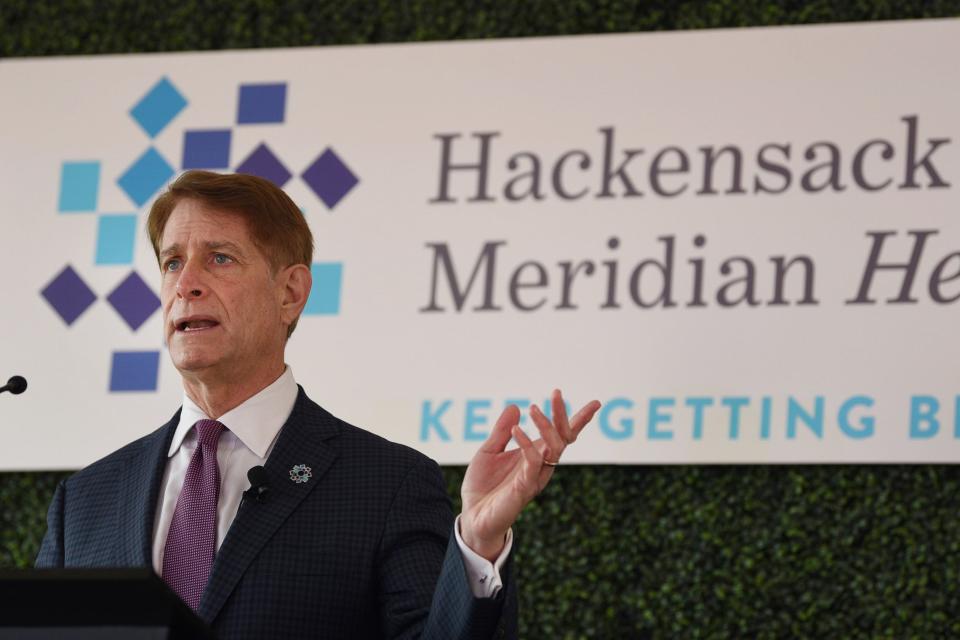Give our health care heroes our respect and compassion. They've earned it | Opinion
At the start of the COVID-19 pandemic nearly two years ago, I was heartened by the outpouring of support for our heroes on the front line: Restaurants and community members delivered food; colorful banners popped up at hospital entrances thanking staff, and clap-outs were common.
I understand that we all have pandemic fatigue, but I have a request: Can we all rally again and show our support for our nurses, doctors and teams, who continue to put patients first? And let’s start with respect and civility in our hospitals.
Sadly, to better protect staff throughout our 17-hospital system in New Jersey and to create a more healing environment, we recently posted signs in hospitals that warn people that “Aggressive or Disruptive Behavioral Will Not Be Tolerated!’’ These examples are posted on the signs: threats, verbal and physical; use of abusive or foul language; failure to respond to staff instructions, and physical assault.
Violence against health care workers is not a new phenomenon. However, staff around the country are reporting an increase in verbal and physical abuse as the pandemic continues to upend our lives. As many as 31% of nurses in the U.S. have reported an increase in workplace violence, up from 22% in March 2021, according to a survey taken this summer by the National Nurses United union. In one system in San Diego, verbal and physical abuse of staff rose 17% through September compared with the prior year. Cleveland Clinic is asking visitors to sign a “partnership pledge’’ to be respectful of caregivers and not raise their voices or use profanity when dealing with staff.
More perspective: Nurses get spit on, kicked, assaulted. Stop hurting us. We are here to help you
Our hospitals, too, are experiencing instances of disrespectful and abusive treatment of our staff and too much hostility in a place of healing. Staff is being verbally abused for reminding people of our mask mandate; even asking a simple question like whether a patient or visitor received a COVID vaccine can provoke anger and hostility. I am hearing this routinely from the front lines.

“We are partners in care, partners with patients, their families and the community,’’ noted Dr. Joseph Underwood, chair of emergency medicine at Hackensack University Medical Center. “Foundational to this partnership is mutual respect and basic human decency. When we don’t see that, it degrades the care of patients, can impact outcomes and breaches our trust.’’
Underwood recently recalled a patient yelling at his physician because he would not give the man the treatment he requested. Even though the doctor explained that it was not indicated for the patient’s situation, the patient grew belligerent.
Please remember that the nation’s health care workforce has been through so much — repeated surges, the deaths of 850,000 Americans — and for many this has resulted in post-traumatic stress. They, too, have been affected personally by COVID, and the virus has stretched the workforce thin. It’s no surprise that about 1 in 5 U.S. health care workers have left the job since the pandemic started. And the next few weeks will be difficult at hospitals throughout the nation: Hospitalizations are at 156,000, but more patients are expected because increases in inpatient volume usually lag behind spikes in overall cases.
We understand that families are frustrated, especially when states restrict visitation in hospitals during surges. This relentless pandemic has stressed families, with disruptions in jobs and in-person learning and an uncertain future, given the persistence of the virus. Health care isn’t the only venue where people are taking out their frustrations: Flight attendants are seeing a historic rise in unruly passengers; 1 in 5 report being physically threatened. Shoppers have even killed retail workers for enforcing local mask mandates.
Let’s remember who is serving on the front lines. Our health care heroes are selfless and deserve our unwavering gratitude, respect and courtesy. Our nurses and physicians make no judgments. Their mission is clear: provide the best and most compassionate care. Patients are the priority. They will be there in our darkest hour. We will get through this together with mutual respect and compassion.

Robert C. Garrett is CEO of Hackensack Meridian Health, New Jersey’s largest health network with 17 hospitals, more than 500 patient care locations and the Hackensack Meridian School of Medicine.
This article originally appeared on NorthJersey.com: NJ health care heroes need our respect and compassion

